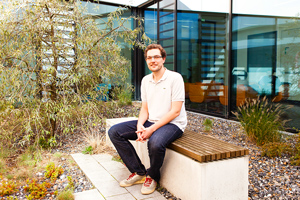Florian Eich receives Marie Curie Individual Fellowship
Supported by the European Commission the junior scientist will conduct a two-year research project on the theory of thermoelectric phenomena at the MPSD located at CFEL in Hamburg.
The development of sustainable energy sources is a great societal challenge. Virtually any form of energy production generates waste heat. Thermoelectric devices that transform at least part of this waste heat into usable electric energy could be a key ingredient to improve the efficiency of energy production processes. In recent years it has become evident that devices on the nanoscale, which implement their functionality at the level of single molecules, could offer a much higher efficiency for the conversion of heat to electricity compared to conventional technologies.
In his project „Density-Functional Theory for Thermoelectric Phenomena” (ThermalDFT), Florian Eich wants to develop the theoretical tools to describe the efficiency of thermoelectric nanodevices. “The innovation of a thermal density-functional theory is to address the charge and energy degrees of freedom of a physical system on the same footing,” explains Florian Eich. “This will allow predicting the thermoelectric properties of molecular devices by numerical simulations and therefore could dramatically reduce the money and time spent in the experimental search for highly efficient thermoelectric devices.”
Florian Eich studied physics at the Freie Universität Berlin and at the University of Illinois at Urbana-Champaign. He prepared his doctoral thesis at the Fritz Haber Institute of the Max Planck Society in Berlin and at the Max Planck Institute of Microstructure Physics in Halle, and received his PhD in physics from the Freie Universität Berlin in 2012. Subsequently, he spent a three-year postdoctoral research stay at the University of Missouri in Columbia. In 2015 he joined the Theory group of Angel Rubio at the Max Planck Institute for the Structure and Dynamics of Matter as a postdoc.
The Marie Skłodowska-Curie actions of the European Commission support researchers at all stages of their careers, irrespective of nationality and scientific discipline. In addition to generous research funding, scientists have the possibility to gain experience abroad and in the private sector, and to complete their training with competences that enhance employability and career development.
Further information:
http://ec.europa.eu/research/mariecurieactions/about-msca/actions/if/index_en.htm
http://cordis.europa.eu/project/rcn/200980_en.html
